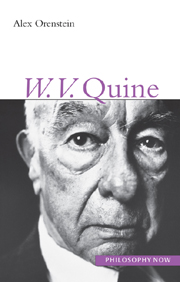7 - Intensional contexts
Summary
Quine is one of the foremost exponents of extensionality.
… A context is intensional if it is not extensional.
Extensionality is much of the glory of predicate logic, and it is much of the glory of any science that can be grammatically embedded in predicate logic. I find extensionality necessary, indeed, though not sufficient for my full understanding of a theory. In particular it is an affront to common sense to see a true sentence go false when a singular term in it is supplanted by another that names the same thing. What is true of a thing is true of it, surely under any name.
Two problematic varieties of intensional contexts are those representing modal notions and propositional attitudes. Two prominent modal functors/operators are those for necessity, i.e. Nec, and for possibility, i.e. Pos. Belief is the most discussed propositional attitude. Unlike extensional functors/operators, such as conjunction or disjunction, or quantifiers, when intensional modal or belief operators/functors are used to form complex sentences, certain replacement principles appear to fail. One of these replacement principles is Leibniz's Law. It states that given a true identity premise:
a = b
and another true sentence containing ‘a’, viz.,
— a —
they jointly imply a conclusion:
— b —
that is obtained by substituting/replacing ‘a’ with ‘b’. Colloquially put, the idea is that equals can be replaced by equals.
However, consider what happens when one applies this rule in a modal and in a propositional attitude context.
- Type
- Chapter
- Information
- W. V. Quine , pp. 149 - 172Publisher: Acumen PublishingPrint publication year: 2002



